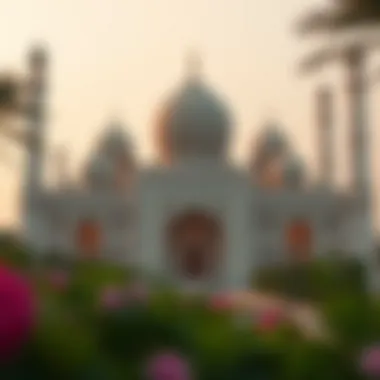National Days and Holidays in the UAE for 2023


Intro
The United Arab Emirates, a nation of rich traditions and modern aspirations, holds its national days and public holidays in high esteem, providing a unique reflection of its culture and history. In 2023, these days not only offer a glimpse into the nation’s identity but also shape various aspects of life, especially in the luxury real estate sector. Understanding these days is vital for investors, realtors, and developers alike—each holiday presents various opportunities and challenges to navigate.
As we delve into this piece, prepare to uncover more than mere dates on a calendar; this exploration will reveal the undercurrents of what these celebrations mean for the residents and visitors alike. How does the spirit of the UAE encapsulate itself through the lens of its holidays? And why should one consider the implications of these cultural touchstones in terms of property investment in vibrant Dubai?
Get ready as we embark on this journey, meticulously dissecting the layers of significance each of these days holds, and their resulting impact on the real estate market too.
Market Insights
The pulse of the UAE’s property market beats in rhythm with its national celebrations. Investment potential swells during these times, alongside human connection and cultural exchange. From National Day on December 2nd to various religious observances, understanding these occasions can enhance investor strategies and decision-making processes.
Current Market Trends
The luxury real estate market in Dubai has shown resilience and adaptability, even amidst fluctuating economic conditions. Significant events, like Eid celebrations, often stimulate short-term demand spikes as expatriates and tourists flood the city. In 2023, this pattern continues—as certain days become synonymous with property viewings and luxury launches.
- Increased activity around holidays: Investors experience a surge in enthusiasm during public holidays, pushing property demand.
- Cultural events: The melding of culture and commerce brings unique opportunities. Homes near popular event venues often see increased interest.
- Networking opportunities: National holidays allow for networking among potential investors, revealing ideas that might not emerge in formal settings.
Future Projections
Forecasting ahead, we can anticipate a more pronounced intertwining of cultural significance and market trends. As a catalyst for growth, holidays will likely influence property values and the types of investments considered prudent by savvy investors.
- Emergence of themed properties: Properties that resonate with national identity, such as designs invoking Emirati heritage, could rise in appeal.
- Smart investment: By aligning purchase and rental strategies with the timing of these holidays, investors can optimize their returns.
"Understanding the cultural backdrop of national days can greatly enhance an investor's ability to make informed decisions."
Through the examination of national days and their intrinsic ties to property trends, one can navigate the UAE real estate landscape with informed intelligence. The robust interplay of culture and investment opens myriad pathways for both current and prospective stakeholders in the luxury property sector.
Overview of National Days and Holidays in the UAE
In the vibrant tapestry of the United Arab Emirates, national days and public holidays are not mere interruptions in daily life; they are profound reflections of the nation’s identity and values. These days encapsulate the spirit of a diverse culture, weaving together various traditions and religious observances that symbolize togetherness and belonging. 2023 presents an opportunity to delve deeper into these celebrations, shedding light on their significance and the cultural underpinnings that support them.
Understanding National Days
National days in the UAE serve as markers of pivotal historical events, offering citizens and residents alike a chance to celebrate their collective journey. For instance, the UAE National Day, celebrated on December 2nd, commemorates the formation of the federation in 1971. This day fosters a sense of unity and national pride, reminding everyone of the remarkable achievements the nation has made since its inception.
These observances often extend beyond the festive atmosphere, reflecting the cultural richness and resilience of the Emirati people. They are a time when families gather, communities come alive with various events, and businesses engage in activities that highlight local heritage. The excitement can be felt in the air, as fireworks light up the skies and traditional performances showcase age-old customs.
Importance of Public Holidays
Public holidays provide crucial respite, allowing individuals time to reconnect with family and friends or indulge in leisure activities, unpacking layers of cultural insights along the way. Each holiday, whether religious like Eid al-Fitr or secular like New Year's Day, carries its significance, shaping lifestyles and consumption patterns within the country.
When looking at the economic implications, these holidays stimulate tourism and local markets, yielding positive impacts across various sectors, especially real estate. Investors, developers, and businesses often observe upticks in activities and transactions during and around these holidays, as people plan events and look to engage with their surroundings. These periods of celebration catalyze spending and investment, fostering an economic environment ripe with opportunities.
"National days signify more than just a date on a calendar; they embody the cultural ethos and historical journey of a nation, offering insights into its identity and collective aspirations."
In summary, understanding national days and public holidays helps underscore their importance in enriching the emotional and economic fabric of the UAE. Whether one is a resident or a visiting investor, appreciating these national observances leads to a more profound understanding of the Emirati landscape—its people, traditions, and ambitions.
Key National Holidays in
Understanding the key national holidays in 2023 is essential for grasping the cultural and social fabric of the UAE. These holidays are not mere days off; they highlight the historical milestones and religious observances that shape the identity of the Emirati people. Investors, realtors, and developers can benefit from recognizing the importance of these holidays, as they often affect market trends, consumer behavior, and tourism dynamics.
New Year’s Day


New Year’s Day, celebrated on January 1st, marks the beginning of the Gregorian calendar year. This holiday is often characterized by various festivities, family gatherings, and fireworks that light up the skies, particularly in Dubai’s iconic spots like the Burj Khalifa.
On this day, people reflect on the past year and set resolutions for the future. The celebratory atmosphere often encourages residential and commercial property viewings, as families and investors look out for new beginnings, making it an ideal time for real estate promotions.
Eid al-Fitr
Eid al-Fitr, usually occurring in late April or early May, signifies the end of Ramadan, the holy month of fasting. This occasion is particularly significant in the Islamic calendar and is observed with a spirit of charity, prayer, and community celebration.
Many people opt to visit family and friends, leading to an uptick in social activities and hospitality services. The holiday also invites a surge in the retail sector, with discounts on property investments and festive deals for potential buyers. The implications for real estate are profound, as buyer interest often swells around this period, given the cultural emphasis on renewal and giving.
Arafat Day and Eid al-Adha
Arafat Day is a deeply important day for Muslims, falling on the second day of the Hajj pilgrimage. It is immediately followed by Eid al-Adha, also known as the Festival of Sacrifice. Celebrated around June or July, this holiday commemorates Ibrahim’s willingness to sacrifice his son as an act of obedience to God.
Families come together to pray and share meals, which often include the ritual sacrifice of an animal. The extended holiday period encourages travel, whereby many Emiratis head to international destinations, potentially cooling down local real estate activity during this time. This can create unique opportunities for purchasing properties with potential rentals or residencies targeted at the tourist influx.
Hijri New Year
The Hijri New Year, known as the Islamic New Year, marks the migration of the Prophet Muhammad from Mecca to Medina. This holiday is usually observed in September, and while it is a quieter celebration compared to others, it holds deep religious significance.
Quiet reflections and family gatherings often characterize this observance. For real estate, the lower market activity around this time can present advantageous conditions for investors looking to close deals or reevaluate property strategies without the competitive pressures of more major holidays.
UAE National Day
On December 2nd, UAE National Day is a grand celebration of the country’s unification in 1971. This day is marked by concerts, parades, and various public displays of the Emirati flag. The festive period fosters a strong sense of national pride, whereby citizens express their affection for the UAE, often engaging in community service or family events.
Real estate professionals can capitalize on this holiday by reflecting on values of loyalty and community when promoting local properties, aligning marketing strategies with the patriotic zeal palpable during this time.
Commemoration Day
Commemoration Day, recognized on November 30th, is dedicated to honoring those who sacrificed their lives for the UAE. This day is steeped in respect and remembrance, with official ceremonies and family observances throughout the country.
While typically a more solemn occasion, it provides an opportunity for real estate firms to connect deeply with the community by ramping up initiatives that support veterans or their families, thereby enhancing goodwill and fostering sustainable business practices.
Overall, understanding these key national holidays offers valuable insights not just into the UAE's cultural landscape, but also the timing and nature of property investment.
"By aligning business objectives with national sentiments, investors and realtors find fertile ground to cultivate lasting relationships in the UAE market."
For more insights on UAE cultural holidays and their impact, refer to resources such as Wikimedia and Britannica.
Detailed Observance of Each Holiday
Understanding how each holiday is observed in the UAE is crucial for grasping the cultural environment of this vibrant nation. Each celebration reflects deep-rooted traditions, communal values, and historical significance. These observances contribute to the national identity and enrich the lifestyles of residents and visitors alike.
Observing these holidays isn’t merely about taking a day off but is steeped in customs that showcase the rich heritage of the Emirates. Participating in these traditions provides a unique window into the lifestyle, character, and collective spirit of the nation. For investors, realtors, and developers, recognizing these observances gives insight into market behaviors and can even guide strategic decisions around property investments and developments.
Celebration Styles and Customs
Every national day or holiday in the UAE is marked by unique styles and customs that resonate with the local populace. Picture bustling streets, adorned with flags and vibrant decorations, as people take to the avenues to express their love for their homeland and share moments of joy.
During UAE National Day, for instance, people don traditional attire, waving flags and sharing sweets with neighbors. Parades take place, showcasing the diversity of the Emirati culture, with various performances that range from folk dances to modern exhibitions reflecting the evolution of the nation. These festivities not only strengthen community bonds but also invite visitors to engage deeply with the local culture.
On Eid al-Fitr, when the fasting of Ramadan concludes, families gather to break their fast with grand feasts. The act of giving, particularly the tradition of Zakat, reinforces charitable acts that are central to this celebration. In public places, it’s common to see women cooking and sharing dishes, while children can often be found donning new clothes, receiving money from elders as a symbol of blessings.


Religious holidays such as Arafat Day are not only solemn but also celebratory, often marked by communal prayers and reflection. Many families may travel to Mecca for Hajj, but those who remain in the UAE partake in special congregational prayers, emphasizing community solidarity in worship.
Religious Practices Associated with Each Holiday
The UAE maintains strong ties to Islam, and religious observance plays a critical role in the way holidays are celebrated. The spiritual aspect of each occasion is complemented by cultural practices, creating a holistic experience that resonates on multiple levels.
For Eid al-Fitr, after the month of fasting, adherents engage in prayers at mosques, signifying gratitude and the unity of the ummah (community). Special khutbahs (sermons) are delivered, often highlighting themes of compassion and generosity. It is customary for people to wear their finest attire, reflecting the joy of the occasion.
Similarly, during Eid al-Adha, which commemorates the willingness of Ibrahim to sacrifice his son, families partake in rituals involving Qurbani, or the sacrifice of livestock. The meat is distributed amongst those in need, reinforcing the tenets of sharing and caring within the community. Many use this time to feed the less fortunate, demonstrating the blend of spirituality and social responsibility.
Religious observances are not limited to prayers and feasts. They are integrated into the very fabric of UAE's society. Public buildings and mosques can be seen decorated, with illuminated calligraphy and Quranic verses that not only beautify but also remind everyone of the core values of faith, kindness, and unity.
Impact of Holidays on the Real Estate Sector in Dubai
The impact of public holidays in Dubai spans beyond mere celebrations; these occasions are pivotal in shaping the dynamics of the real estate market. As international and local festivities draw visitors and residents alike, the demand for properties—be it for residential, rental, or commercial purposes—often sees a notable surge. Understanding how these holidays influence market behaviors provides insightful context for potential investors and industry stakeholders, enabling them to make informed decisions amidst fluctuating market conditions.
Market Trends During Holidays
During national festivities such as Eid al-Fitr and UAE National Day, there is a tangible increase in real estate activity. The holidays create perfect opportunities for developers and agents to showcase properties. In 2023, we can expect that certain developments will offer discounts or exclusive packages enticing buyers.
- Increased Listings: As demand escalates, real estate agencies often ramp up their listings, showcasing newly developed projects or established properties that are attractive to buyers seeking investment opportunities.
- Staging and Open Houses: Many sellers leverage the holiday spirit, holding open houses or staging homes to highlight their best features effectively. Potential buyers are more likely to engage with properties when they can envision themselves celebrating in those spaces.
The bustling atmosphere during holidays translates into higher foot traffic at real estate expos and open houses, creating a stimulating environment for transactions.
Impact on Property Transactions
Holidays can trigger fluctuations in property transactions due to a combination of buyer sentiment and market availability. In particular, public holidays offer a timeout where potential buyers take a breather from their daily routines, often leading to spontaneity in purchasing decisions.
- Motivation to Buy: With extra time off, many families will search for their ideal home, seeking properties that not only fit their desires but also provide a lifestyle conducive to future celebrations.
- Short-term Rentals: Investors see holidays as a prime time for short-term rentals. Owners of properties in key locations, like downtown Dubai or near tourist hubs, often capitalize on elevated demand, leading to increased transaction volumes in the rental market.
Transactions can also be influenced by incentives provided by developers during these peak times. Special holiday offers on down payments or reduced service charges often catch the eyes of prospective buyers.
Visitor Traffic and Rental Market Influence
Holidays in the UAE attract significant numbers of tourists, which in turn impacts the rental market and overall property demand. Travel itineraries during these periods often integrate luxurious lodging experiences, making short-term rental properties particularly desirable.
- Rental Prices Fluctuation: The rental market usually sees a bump, with price increases for holiday bookings. Property owners might increase their rates or enjoy higher occupancy rates during this timeframe, leading to higher gross rental income.
- Tourist Attraction: When national events or celebrations occur, tourism tends to flourish. Visitor numbers can rise exponentially during Eid holidays or National Day celebrations, prompting the real estate sector to adapt rapidly to meet demand.
This interdependence between public holidays and the real estate sector underlines the importance of strategic planning for industry players, particularly for those looking to maximize their returns during peak times.
Investment Opportunities During Holidays
The holidays in the UAE present a unique avenue for investment, especially in the real estate sector. With the national days offering a backdrop of community spirit and celebration, investors have a stronger incentive to engage in property transactions. Understanding the nuances around these timing can yield critical insights into maximizing investment potential.
When national holidays arrive, not only do they foster a celebratory atmosphere, they also create ideal conditions for promotional sales, encouraging prospective buyers and minimizing the barriers that typically surround property investments. The confluence of public festivities with real estate interests forms a potent cocktail of opportunity, making it a ripe time for seasoned investors and newcomers alike to dive in.
Seasonal Discounts and Promotions
During the national holidays, many real estate developers and agents roll out attractive discounts and promotional offers, which are especially appealing to buyers looking to snag a good deal. This includes reduced prices on property listings, waived service fees, and sometimes even mortgage incentives.
For instance, developers like Emaar Properties and Nakheel often capitalize on these festive periods by introducing limited-time offers that provide potential buyers an edge in a competitive market. Other benefits might include:
- Free furniture packages which enhance move-in attractiveness.
- Flexible payment plans that might not be available during regular seasons.
- Utility discounts or allowances, typically beneficial for new homeowners.


Such promotions not only make properties more affordable but also create an engaging buying experience, as buyers tend to feel connected to the festive vibes, triggering a sense of urgency and excitement that can tip the scales in favor of making a purchase.
"In a market where luxury meets lifestyle, the right holiday promotion can capture the attention of potential investors looking for that perfect slice of Dubai living."
Ideal Periods for Property Investment
Timing is everything in the world of real estate. Among the various national holidays, certain dates stand out as prime opportunities for property investment. For example, during Eid al-Fitr, there is often a significant influx of visitors and residents alike, all interacting within a bubbling economy. This rise in activity intensifies the demand for housing, both for purchase and rental.
In addition to Eid, UAE National Day in December attracts considerable investor attention. The sense of patriotism drives people to consider their long-term commitments in the country, leading to vibrant investor interest.
Consider these factors when plotting your investment timeline:
- Market activity peaks during these holidays, potentially leading to quicker property turnover.
- Increased visitor traffic often translates into higher demand for rentals, enhancing your owner's advantage.
- Cultural events draw locals and expats together, fostering a community spirit that makes the prospect of investing more appealing.
In summary, aligning your investment activity with these holiday periods not only enhances the visibility of your properties but can significantly impact your return on investment when managed strategically. Being attuned to market movements and utilizing the momentum of national celebrations presents both challenge and opportunity in equal measure.
Cultural Significance of National Days
National days in the UAE offer a profound glimpse into the cultural tapestry of this dynamic nation. Each holiday serves not only as a day off work but as a reaffirmation of the values, traditions, and historical milestones integral to the UAE’s identity. The observance of these days is more than just a ceremonial exercise; they bring together citizens and residents in joyful celebrations that transcend the mundane privatization of daily life. In 2023, as in the past, these national days highlight the rich cultural fabric that makes the UAE unique.
Embodying UAE Heritage
The national days reflect a deep respect for the UAE's heritage, encapsulating centuries of tradition. Events like UAE National Day and Commemoration Day resonate with stories of past leaders, battles fought, and the unity forged among the seven emirates. Local customs are alive in these celebrations, where traditional music fills the air, and folk dances take over the streets.
Through activities like falconry displays or camel racing, the nation remembers its roots. Moreover, these holidays provide an invaluable opportunity for the youth to connect with their cultural heritage, ensuring that the lessons of history are not lost.
- The UAE National Day, celebrated on December 2nd, is a significant date marking the formation of the federation in 1971. It’s a time when skyscrapers are adorned with flags, and various community events burst into life, showcasing the resilience and creativity of its people.
This journey through celebration allows not only for reflection on the past but serves as a strong reminder of how the UAE has evolved into a hub of innovation while still paying homage to its roots. Festivals that honor Emirati cuisine, arts, and crafts showcase local craftsmanship, which is increasingly important as global influences grow.
Fostering National Pride
National days function as a catalyst for fostering a sense of pride among Emiratis. They create an emotional connection to the nation, allowing citizens and expatriates alike to participate in the narrative of collective achievement and resilience.
During these holidays, there is a palpable spirit of unity in the air, where diverse communities come together to celebrate their common identity. This can be seen in the enthusiastic participation in parades and public events. People often don traditional attire, share meals, and engage in activities that promote intercultural dialogue.
"On national days, we stand as one, showcasing our diversity while cherishing our common heritage. It’s this blend that fuels our national pride."
For investors or those considering relocation, understanding this cultural significance can enhance networking opportunities, aligning values with local customs. The act of participating in national days can open doors, fostering connections that transcend mere business transactions.
Epilogue
Recognizing national days and public holidays in the UAE holds substantial weight, not only in terms of cultural identity, but also for social cohesion and economic implications. These days serve as a reminder of the nation’s history, fostering a sense of belonging among residents and enhancing communal ties. It helps in weaving together the diverse fabric of UAE's population, reminding them of shared values and aspirations.
The Importance of Recognizing National Days
Understanding the significance of national days transcends mere observance. Every holiday marks a pivotal moment in the history and heritage of the UAE. For instance, UAE National Day isn’t just about festivities; it showcases unity, celebrating the federation of seven emirates. By recognizing these days, residents can strengthen their cultural knowledge and develop a deeper appreciation for the rich heritage of the nation.
Furthermore, national days often trigger various initiatives that promote local businesses and tourism. Celebrate or even participate in events like the Abu Dhabi Festival or Dubai Shopping Festival showcases local talent and is a boon for small and medium enterprises. When the community rallies together, it enhances local economies, making it a win-win for all.
Future Implications for the Real Estate Market
The correlation between public holidays and the real estate market is noteworthy, particularly in a market as dynamic as Dubai's. As cultural and festive events unfold, they spur demand in various sectors, including real estate. Property developers can benefit from recognizing the ebb and flow of these occasions. For instance, holidays often lead to increased travel, which directly influences rental markets. Tourists flock to the city during Eid and other major holidays, paving the way for high occupancy rates.
Moreover, savvy investors would do well to recognize the patterns tied to these holidays. Understanding when property demand peaks can enable them to make informed decisions, capitalizing on seasonal trends. By blending cultural insights and real estate strategy, investors can effectively navigate the market.
"As the UAE continues to grow, understanding its roots becomes crucial for navigating its future."
For further reading on UAE’s culture and real estate trends, you may refer to Wikipeda or Britannica.











